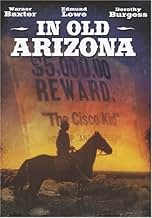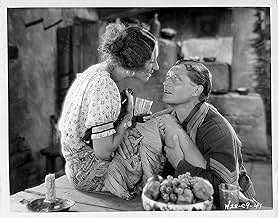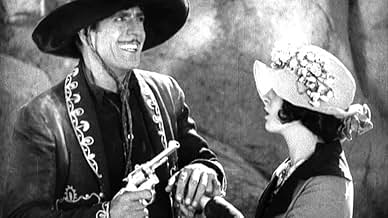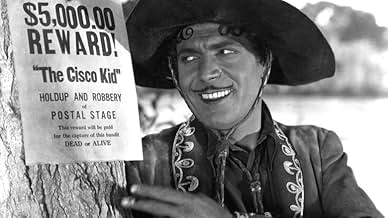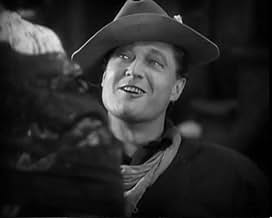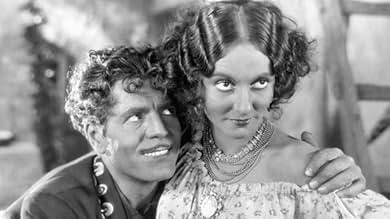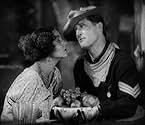IMDb-BEWERTUNG
5,5/10
1347
IHRE BEWERTUNG
Füge eine Handlung in deiner Sprache hinzuA charming, happy-go-lucky bandit in old Arizona plays cat-and-mouse with the sheriff trying to catch him while he romances a local beauty.A charming, happy-go-lucky bandit in old Arizona plays cat-and-mouse with the sheriff trying to catch him while he romances a local beauty.A charming, happy-go-lucky bandit in old Arizona plays cat-and-mouse with the sheriff trying to catch him while he romances a local beauty.
- 1 Oscar gewonnen
- 4 Gewinne & 4 Nominierungen insgesamt
Henry Armetta
- Barber
- (Nicht genannt)
James Bradbury Jr.
- Soldier
- (Nicht genannt)
Frank Campeau
- Man Chasing Cisco
- (Nicht genannt)
John Webb Dillion
- Second Soldier
- (Nicht genannt)
Alphonse Ethier
- Sheriff
- (Nicht genannt)
Jim Farley
- Townsman
- (Nicht genannt)
William Gillis
- Guard
- (Nicht genannt)
Pat Hartigan
- Cowpuncher
- (Nicht genannt)
Soledad Jiménez
- Tonita the Cook
- (Nicht genannt)
Ivan Linow
- Russian Immigrant
- (Nicht genannt)
Tom London
- Man in Saloon
- (Nicht genannt)
Helen Lynch
- Stagecoach Passenger
- (Nicht genannt)
J. Farrell MacDonald
- Stage Passenger
- (Nicht genannt)
Julius Viggo Madsen
- Tenor in Quartet
- (Nicht genannt)
Handlung
WUSSTEST DU SCHON:
- WissenswertesThe first all-talking, sound-on-film feature shot outdoors.
- PatzerWhen Cisco robs the stagecoach, he is wearing an army holster (flap-over), the same type the Sergeant wears. But for the rest of the movie, he wears an open holster.
- Zitate
[last lines]
The Cisco Kid: Her flirting days are over. And she's ready to settle down.
- VerbindungenFeatured in The Soundman (1950)
- SoundtracksMy Tonia
Words and Music by Buddy G. DeSylva (as DeSylva), Lew Brown (as Brown) and Ray Henderson (as Henderson)
Sung by Warner Baxter (uncredited)
Ausgewählte Rezension
IN OLD ARIZONA (Fox, 1928/29), directed by Irving Cummings and Raoul Walsh, marks the new beginning in motion picture history as the first all-talking western and the first with sound to be use actual location scenes to take advantage of the great outdoors rather than using indoor shots with rear projection passing for exteriors. With silent films still essential at the time of its release (January 1929), novelties such as this hearing actors speaking their lines rather than reading what they're saying through the use of inter-titles would soon put the silent films out to pasture. While not the first motion picture about the Cisco Kid, this was the start of a long series of westerns featuring the bandito as originated in O. Henry's short story, "The Caballero's Way," from which this movie was based. Anyone familiar with the 1950s TV series, "The Cisco Kid" starring Duncan Renaldo and Leo Carrillo, and expecting IN OLD ARIZONA to have Cisco and his sidekick Pancho saving the day, would be disappointed mainly because this Cisco Kid is more true to O'Henry's creation than the future films and television incarnations. The Cisco Kid is a bandit who works very much alone, being one step ahead of anyone out to claim their reward on his capture, dead or alive. "Oh Cisco! No Pancho!"
The story gets underway with passengers boarding the Gila Tombstone Stagecoach bound for its destination. This scene is followed by the introduction of the Cisco Kid (Warner Baxter) taking the wanted poster sign from a tree bearing his name with a $5,000 price on his head. After holding up the stagecoach, he goes on his way. Sergeant Mickey Dunn (Edmund Lowe) is assigned by his Commandant (Roy Stewart) to capture this bandit. During his mission, Mickey finds time flirting with various tough bar women, namely Tonia (Dorothy Burgess), who's not only Cisco's girl but girlfriend to every cowboy in town. Wanting to collect the reward on Cisco's capture, Tonia sets a trap on him, but Cisco has other plans for her once he discovers her true "loyalty" towards him.
IN OLD ARIZONA looks like a western, plays like a western, in fact, is a western, but doesn't have the pace more commonly found in westerns of subsequent eras. Being a primitive talkie, that's to be expected. The only musical backdrop presented is during opening credits and exit music, each to the fine and beautiful theme song, "My Tonia." Aside from the Cisco Kid serenading to Tonia, there are others singing to the tune to "Bicycle Built for Two," while Edmund Lowe's vocalizes "The Bowery" For this first western with sound, the audio use of church bells, the mooing of cows, the hoofs of running horses and gunshots appear to be more essential and beneficial than the action itself, which may be the reason why IN OLD ARIZONA is hardly revived, regardless of its then popularity and Academy Award nominations, including Best Picture. It's only known commercial television presentation was on a Hartford, Connecticut station, WFSB, Channel 3, in 1974.
As much as the Cisco Kid could have been enacted by natural born Hispanic actors as Antonio Moreno or Gilbert Roland (who later enacted the role in the 1940s), for example, the part went to Warner Baxter (his talking film debut), who won an best actor Academy Award for it. Baxter's accent and Mexican attire are believable, character acceptable, for that his achievement in a role not true to his background shows more effort than having an natural-born Mexican playing a Mexican. Whenever Baxter's Cisco is off screen for long intervals, and Mickey Dunn's involvement with saloon girls (one claiming "all men are bums"), taking too much screen time, the pace slows down considerably. Although Lowe's character weakens the film somewhat, especially with his portrayal being more to the liking of Sergeant Quirt, the role he originated so well in WHAT PRICE GLORY? (Fox, 1926), yet without Victor McLaglen as his counterpart, it misses something. Lowe does have a scene worth nothing, however, set in the barber shop where he is playing dice and conversing with barber Guiseppi (Henry Armetta) about wanting to meet up with the Cisco Kid, unaware that Cisco is sitting close by in the barber's chair with his face covered with a towel. Dunn and Cisco become acquainted before going on their separate ways. When Dunn discovers he shook hands with the man he's out to arrest, the noise made by a donkey is sounded behind him, making him feel like a "jack ass."
Dorothy Burgess (in movie debut), is fine as Tonia, whose performance makes one wonder how WHAT PRICE GLORY heroine Dolores Del Rio might have succeeded as the Mexican saloon girl if given to her, and a chance to be reunited with Edmund Lowe on screen again? Soledad Jimenez and J. Farrell MacDonald appear unbilled in smaller roles. Baxter reprized his role in THE CISCO KID (Fox, 1931) and again in THE RETURN OF THE CISCO KID (20th-Fox, 1939), which started the cycle of "Cisco Kid" program westerns with Cesar Romero taking over the role afterword's. After the series expired by 1942, the Cisco Kid was resurrected again in a whole new series for Monogram (1945-1948) and United Artists (1949-50) featuring Gilbert Roland and later Duncan Renaldo, who carried on his Cisco portrayal to television.
Having been fortunate to acquire a 2005 DVD copy of IN OLD ARIZONA is assuring to know that this western antique is readily available for film and western enthusiasts to view and study the movie that helped advance the career of Warner Baxter in an unlikely role as The Cisco Kid. (***)
The story gets underway with passengers boarding the Gila Tombstone Stagecoach bound for its destination. This scene is followed by the introduction of the Cisco Kid (Warner Baxter) taking the wanted poster sign from a tree bearing his name with a $5,000 price on his head. After holding up the stagecoach, he goes on his way. Sergeant Mickey Dunn (Edmund Lowe) is assigned by his Commandant (Roy Stewart) to capture this bandit. During his mission, Mickey finds time flirting with various tough bar women, namely Tonia (Dorothy Burgess), who's not only Cisco's girl but girlfriend to every cowboy in town. Wanting to collect the reward on Cisco's capture, Tonia sets a trap on him, but Cisco has other plans for her once he discovers her true "loyalty" towards him.
IN OLD ARIZONA looks like a western, plays like a western, in fact, is a western, but doesn't have the pace more commonly found in westerns of subsequent eras. Being a primitive talkie, that's to be expected. The only musical backdrop presented is during opening credits and exit music, each to the fine and beautiful theme song, "My Tonia." Aside from the Cisco Kid serenading to Tonia, there are others singing to the tune to "Bicycle Built for Two," while Edmund Lowe's vocalizes "The Bowery" For this first western with sound, the audio use of church bells, the mooing of cows, the hoofs of running horses and gunshots appear to be more essential and beneficial than the action itself, which may be the reason why IN OLD ARIZONA is hardly revived, regardless of its then popularity and Academy Award nominations, including Best Picture. It's only known commercial television presentation was on a Hartford, Connecticut station, WFSB, Channel 3, in 1974.
As much as the Cisco Kid could have been enacted by natural born Hispanic actors as Antonio Moreno or Gilbert Roland (who later enacted the role in the 1940s), for example, the part went to Warner Baxter (his talking film debut), who won an best actor Academy Award for it. Baxter's accent and Mexican attire are believable, character acceptable, for that his achievement in a role not true to his background shows more effort than having an natural-born Mexican playing a Mexican. Whenever Baxter's Cisco is off screen for long intervals, and Mickey Dunn's involvement with saloon girls (one claiming "all men are bums"), taking too much screen time, the pace slows down considerably. Although Lowe's character weakens the film somewhat, especially with his portrayal being more to the liking of Sergeant Quirt, the role he originated so well in WHAT PRICE GLORY? (Fox, 1926), yet without Victor McLaglen as his counterpart, it misses something. Lowe does have a scene worth nothing, however, set in the barber shop where he is playing dice and conversing with barber Guiseppi (Henry Armetta) about wanting to meet up with the Cisco Kid, unaware that Cisco is sitting close by in the barber's chair with his face covered with a towel. Dunn and Cisco become acquainted before going on their separate ways. When Dunn discovers he shook hands with the man he's out to arrest, the noise made by a donkey is sounded behind him, making him feel like a "jack ass."
Dorothy Burgess (in movie debut), is fine as Tonia, whose performance makes one wonder how WHAT PRICE GLORY heroine Dolores Del Rio might have succeeded as the Mexican saloon girl if given to her, and a chance to be reunited with Edmund Lowe on screen again? Soledad Jimenez and J. Farrell MacDonald appear unbilled in smaller roles. Baxter reprized his role in THE CISCO KID (Fox, 1931) and again in THE RETURN OF THE CISCO KID (20th-Fox, 1939), which started the cycle of "Cisco Kid" program westerns with Cesar Romero taking over the role afterword's. After the series expired by 1942, the Cisco Kid was resurrected again in a whole new series for Monogram (1945-1948) and United Artists (1949-50) featuring Gilbert Roland and later Duncan Renaldo, who carried on his Cisco portrayal to television.
Having been fortunate to acquire a 2005 DVD copy of IN OLD ARIZONA is assuring to know that this western antique is readily available for film and western enthusiasts to view and study the movie that helped advance the career of Warner Baxter in an unlikely role as The Cisco Kid. (***)
Top-Auswahl
Melde dich zum Bewerten an und greife auf die Watchlist für personalisierte Empfehlungen zu.
- How long is In Old Arizona?Powered by Alexa
Details
Box Office
- Bruttoertrag in den USA und Kanada
- 2.834.000 $
- Laufzeit1 Stunde 35 Minuten
- Farbe
Zu dieser Seite beitragen
Bearbeitung vorschlagen oder fehlenden Inhalt hinzufügen


